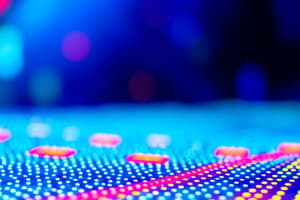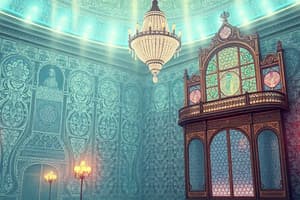Podcast
Questions and Answers
Which of the following is a key characteristic of LEDs?
Which of the following is a key characteristic of LEDs?
- They are not suitable for battery-powered devices
- They have a shorter lifespan compared to traditional bulbs
- They are more energy-efficient than traditional incandescent bulbs (correct)
- They emit light in all directions
What determines the color of the light emitted by an LED?
What determines the color of the light emitted by an LED?
- The amount of doping (correct)
- The shape of the LED
- The size of the LED
- The voltage applied to the LED
What is a benefit of the compact size of LEDs?
What is a benefit of the compact size of LEDs?
- They emit light in all directions
- They are more durable and resistant to shock and vibration
- They can be easily integrated into electronic devices (correct)
- They have a longer lifespan compared to traditional bulbs
Which company developed the first practical LED display?
Which company developed the first practical LED display?
When were LEDs first invented?
When were LEDs first invented?
What are microLED displays?
What are microLED displays?
Which material is commonly used as the substrate for LED production?
Which material is commonly used as the substrate for LED production?
Which company has stopped research on GaN on Si LEDs?
Which company has stopped research on GaN on Si LEDs?
What is the term for patterned wafers used in LED production?
What is the term for patterned wafers used in LED production?
Which major corporations are currently developing MicroLED displays?
Which major corporations are currently developing MicroLED displays?
What is the main advantage of LEDs over incandescent light sources?
What is the main advantage of LEDs over incandescent light sources?
What was the first visible-light color produced by LEDs?
What was the first visible-light color produced by LEDs?
What is a disadvantage of LEDs compared to incandescent lamps?
What is a disadvantage of LEDs compared to incandescent lamps?
Who discovered near-infrared light emission from a tunnel diode on a GaAs substrate?
Who discovered near-infrared light emission from a tunnel diode on a GaAs substrate?
What was the first practical LED?
What was the first practical LED?
Which company was the first to mass-produce visible LEDs?
Which company was the first to mass-produce visible LEDs?
What was the first commercial LED product announced by Texas Instruments?
What was the first commercial LED product announced by Texas Instruments?
Which technology revolutionized digital display technology by replacing the Nixie tube and becoming the basis for later LED displays?
Which technology revolutionized digital display technology by replacing the Nixie tube and becoming the basis for later LED displays?
Which LED technology provided an efficient source of red and amber in the late 1980s?
Which LED technology provided an efficient source of red and amber in the late 1980s?
What color LED was hardly green at all and mostly yellow in the early stages of LED development?
What color LED was hardly green at all and mostly yellow in the early stages of LED development?
Which LED technology opened up possibilities for big LED video displays by introducing the blue and later green LED?
Which LED technology opened up possibilities for big LED video displays by introducing the blue and later green LED?
Which company introduced the first LED device to use integrated circuit technology?
Which company introduced the first LED device to use integrated circuit technology?
What did the HP Model 5082-7000 Numeric Indicator replace?
What did the HP Model 5082-7000 Numeric Indicator replace?
Who demonstrated the first blue electroluminescence from zinc-doped gallium nitride?
Who demonstrated the first blue electroluminescence from zinc-doped gallium nitride?
Who was awarded the Nobel Prize in Physics for the invention of an efficient gallium nitride blue LED?
Who was awarded the Nobel Prize in Physics for the invention of an efficient gallium nitride blue LED?
Study Notes
Characteristics and History of LEDs
- A key characteristic of LEDs is their compact size, which allows for flexibility in design and use.
- LEDs were first invented in 1962.
Color Emission and Production
- The color of the light emitted by an LED is determined by the semiconductor material used.
- GaN (gallium nitride) is a common material used as the substrate for LED production.
- Patterned wafers used in LED production are referred to as epi-wafers.
- In the late 1980s, the introduction of GaAlAs (gallium aluminum arsenide) provided an efficient source of red and amber LEDs.
- The development of InGaN (indium gallium nitride) technology opened up possibilities for big LED video displays by introducing blue and later green LEDs.
Companies and Innovations
- The first practical LED display was developed by Texas Instruments.
- Fairchild Semiconductor was the first company to mass-produce visible LEDs.
- Texas Instruments announced the first commercial LED product, the HP Model 5082-7000 Numeric Indicator, which replaced the Nixie tube.
- Hewlett-Packard (HP) introduced the first LED device to use integrated circuit technology.
- Apple, Samsung, and Sony are currently developing MicroLED displays.
Scientists and Awards
- Oleg Losev discovered near-infrared light emission from a tunnel diode on a GaAs substrate.
- Shuji Nakamura demonstrated the first blue electroluminescence from zinc-doped gallium nitride and was awarded the Nobel Prize in Physics for the invention of an efficient gallium nitride blue LED.
Advantages and Disadvantages
- The main advantage of LEDs over incandescent light sources is their compact size and flexibility.
- A disadvantage of LEDs compared to incandescent lamps is their limited heat dissipation capability.
Studying That Suits You
Use AI to generate personalized quizzes and flashcards to suit your learning preferences.
Description
Test your knowledge on LED technology and its applications with this quiz. Learn about the efficiency, characteristics, and wide range of uses of Light-Emitting Diodes (LEDs) in electronic devices and advertising billboards.




